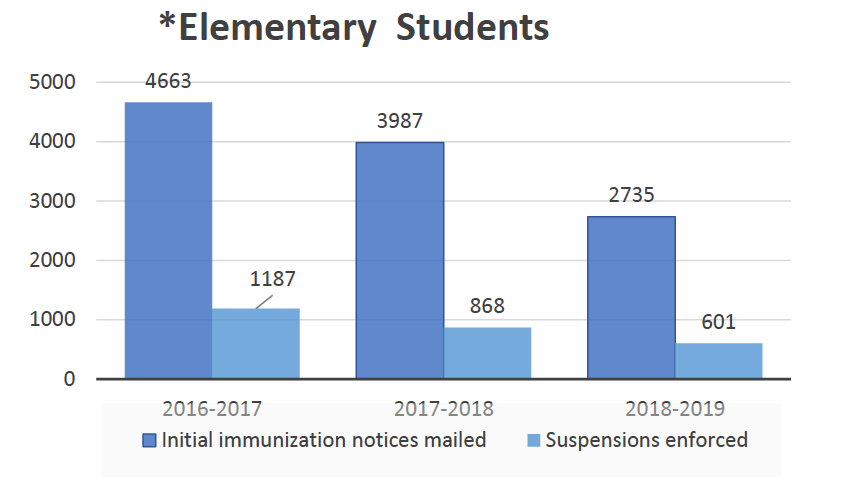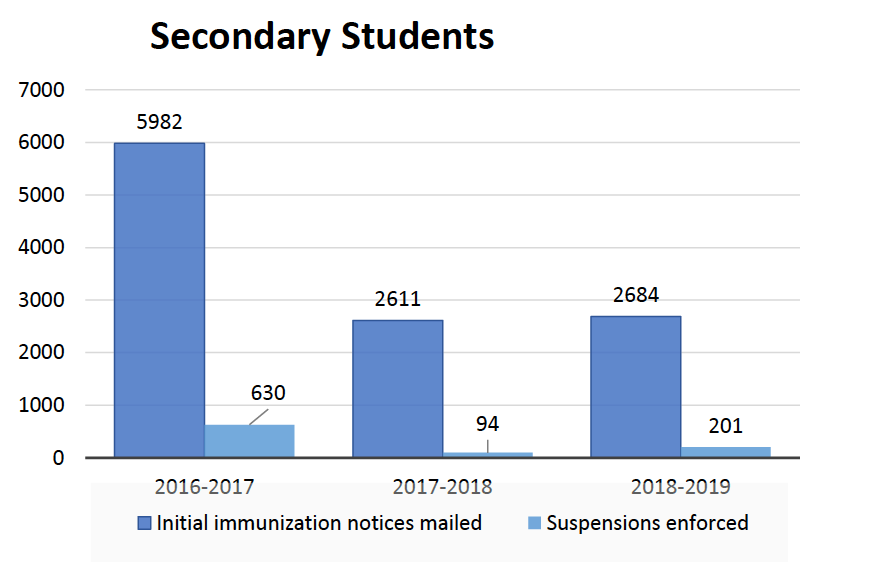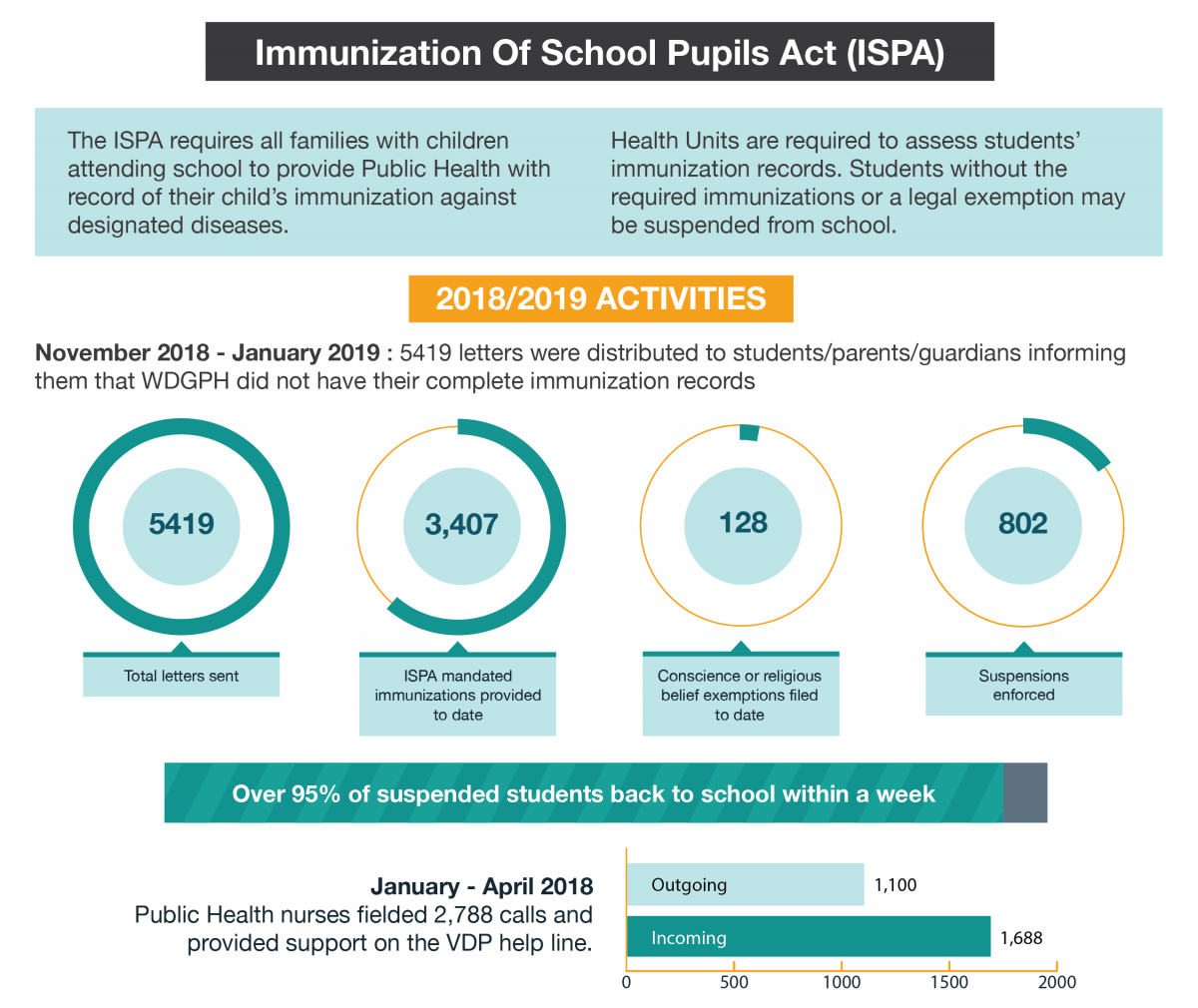Meeting Date: June 5, 2019
Report No. BH.01.JUN0519.R14
Prepared By: Marlene Jantzi-Bauman, Manager, Vaccine-Preventable Disease Program
Approved By: Rita Isley, Director, Community Health
Submitted By & Signature: Dr. Nicola J. Mercer, MD, MBA, MPH, FRCPC Medical Officer of Health & CEO
Recommendations
It is recommended that the Board of Health:
1. Receive this report for information.
Key Points
- Wellington-Dufferin-Guelph Public Health (WDGPH) is mandated to assess, maintain and report the immunization records for students attending primary or secondary school in accordance with the Immunization of School Pupils Act (ISPA) and the Immunization for Children in Schools and Licensed Child Care Settings Protocol, 2018.
- An annual assessment of immunization records remains an effective way to improve immunization rates and accuracy of records.
- WDGPH sent 5,419 immunization notices to students or parents of these students, aged 4-17 years old who did not have up-to-date immunization records in 2018/2019.
- Most records were updated prior to the deadline and only 802 suspension orders were enforced.
Background
Public Health’s Role and the ISPA
The ISPA requires that parents of children enrolled in school provide their local Medical Officer of Health with proof of immunization against designated diseases.1 Public health units are required to assess immunization records and notify those with incomplete immunization records.1 For the 2019-2020 school year, Public Health Units are required to report the number and percentage of students who received a minimum of one assessment notice and the total number of students suspended in the reporting period to the Ministry.
Exemptions are permitted for medical reasons or can be based on a Statement of Conscience or Religious belief (SOC).1 Parents seeking an SOC exemption must also complete a 30-minute immunization education session at their local public health unit.1 Students without a complete immunization record or a valid exemption may be suspended from school until the required records are provided to public health.1
Immunization records for all Wellington, Dufferin and Guelph (WDG) students in public, private and catholic schools were assessed. Children from parochial schools were not suspended when incomplete records were discovered. WDGPH considers children from parochial schools at risk of not returning to school if a suspension is enforced, and these children already experience significant barriers to education. Individualized plans were made for these students to complete outstanding immunizations.
Parents and students were notified that failure to update incomplete immunization records would result in suspension. In December 2018 and January 2019, 5,419 letters were distributed to students/parents/guardians informing them that WDGPH did not have complete immunization records. The notices included the student’s overdue vaccinations and instructions for submitting records, clinic availability, and a deadline for submission. WDGPH provided immunization clinics in secondary schools to provide students with access to immunization services. WDGPH clinics, including after hours appointments, were also available to accommodate the volume of students requiring updated immunizations. From November 1, 2018 to April 30, 2019, WDGPH nurses provided 3,407 ISPA required immunizations to children under 18 years of age. Reminder phone calls were completed in advance of suspension day for all students with outstanding records remaining. Figures 1 and 2 provide a comparison of three years of suspension data.
Figure 1. A three-year comparison of elementary student suspension rates

| Number of Students | |||
|---|---|---|---|
| Year | 2016-2017 | 2017-2018 | 2018-2019 |
| Initial immunization notices mailed | 4663 | 3987 | 2735 |
| Suspensions enforced | 1187 | 868 | 601 |
Figure 2. A three-year comparison of secondary student suspension rates

| Number of Students | |||
|---|---|---|---|
| Year | 2016-2017 | 2017-2018 | 2018-2019 |
| Initial immunization notices mailed | 5982 | 2611 | 2684 |
| Suspensions enforced | 630 | 94 | 201 |
WDGPH continues to seek out opportunities to improve client satisfaction with the ISPA process and create efficiencies with the program. For the 2018/2019 school year, WDGPH implemented Immunization Connect Ontario (ICON), a provincial database that offers clients the opportunity to view, print or report immunization records online. This service is accessible with a valid Ontario Health card number. To date, WDGPH has received 1,685 submissions via this system.
Public Health’s Role and the Childcare and Early Years Act (CCEYA)
Under the CCEYA, child care centre operators are required to follow the immunization recommendations made by the local Medical Officer of Health, for staff and enrollees of child care centres.2 Staff and enrollees are required to have a notarized SOC exemption completed if they refuse a vaccination for religious or philosophical reasons.2 Medical exemptions can also be obtained where appropriate.2 Public Health does not suspend children from licensed childcare centres for incomplete records, however childcare centre operators may refuse to provide childcare services until records are provided.
The Immunization for Children in Schools and Licensed Child Care Settings Protocol, 2018, requires WDGPH to collect annual enrollment lists from 67 licensed centres and review immunizations records.1 Public Health is required to annually report the number and percentage of Child Care Centres that submitted enrollment lists to the Ministry. Children with incomplete records according to Ontario’s publicly funded schedule will be advised to contact their physician for recommended vaccines or submit an updated record.
The Ministry of Education reviews staff immunization records and exemptions routinely as part of the licence and inspection process. Child care operators are required to keep records for staff and children on file.1-2
Discussion
The 2018/2019 school year is the third year WDGPH has assessed the records for all children enrolled in schools and licensed childcare centres. Children between the ages of 4-17 and enrolled in school were assessed under the Immunization of School Pupils Act (ISPA) while children ages 0-3 in licensed childcare are assessed under the Child Care & Early Years Act (CCEYA).
Records assessment activities provide ongoing opportunities for education of parents and collaboration with school boards and childcare centre operators. Public Health Nurses maximize opportunities to provide education about vaccines and vaccine preventable diseases, the importance of providing immunization status and the process for obtaining an exemption. Comprehensive assessments and suspensions assist WDGPH in obtaining accurate immunization coverage data for our communities. This information helps to inform WDGPH programs and practice, most importantly, who needs protection during an outbreak in a school or childcare setting.
Each school and licensed childcare centre is linked with a Public Health Nurse for a direct point of contact for records assessment and suspension. The vaccine preventable disease team maintains the live-answer intake line where anyone can access immediate support from a Public Health Nurse. Successful communication with school boards, school staff, licensed childcare providers, healthcare providers, and the public, remains a key focus in the successful completion of ISPA related activities.
Negative impact on community relationships remains a risk for WDGPH when enforcing the ISPA. WDGPH continues to support school staff and promote awareness of the responsibilities of parents/guardians and students to report all immunizations to Public Health. Community healthcare providers experience the impact of increased numbers of clients asking for their immunizations to be updated or their records sent to Public Health. WDGPH encourages healthcare providers to regularly report immunizations given to children age 0-18 in order to maintain an accurate record and minimize high volume impacts around suspension.
Suspension is the last resort WDGPH utilizes when assessing and updating student records. Students identified as “at risk” for other adverse life events if unable to attend school were not suspended. Public Health Nurses worked closely with school staff to identify these students. Once identified, these families were contacted and offered support in accessing immunization or submitting records or creating an individualized follow up plan. In cases where students were suspended for more than a week, Public Health Nurses followed up with the principals and families to implement a plan to help these students update their records and return to school as soon as possible.
Conclusion
The ISPA and related activities remains an effective method of maintaining accurate immunization records Implementing the ISPA in all grades and daycares over the last 3 years has resulted in decreasing the number of children with incomplete records and resulting suspensions year over year. WDGPH will continue to work with community healthcare providers and school boards to improve the collection of immunization data that is an integral part of protecting the community from vaccine preventable diseases.
Ontario Public Health Standard
- VPD Goal: To reduce or eliminate the burden of vaccine preventable diseases.
- There is reduced incidence of vaccine preventable diseases.
- Target coverage rates for vaccine preventable diseases are achieved.
- There is increased healthcare provider knowledge of immunization.
- There is increased public knowledge of immunization.
- There is improved effectiveness of publicly funded immunization programs.
WDGPH Strategic Direction(s)
✓ Health Equity: We will provide programs and services that integrate health equity principles to reduce or eliminate health differences between population groups.
Organizational Capacity: We will improve our capacity to effectively deliver public health programs and services.
✓ Service Centred Approach: We are committed to providing excellent service to anyone interacting with WDG Public Health.
✓ Building Healthy Communities: We will work with communities to support the health and well-being of everyone.
Health Equity
Research shows that families with fewer social and economic resources are more likely to have children that are not fully immunized.3 WDGPH offers an assessment and suspension timeline that provides multiple opportunities to be notified of incomplete records, in addition to live telephone support with access to language interpreters. Every year Public Health Nurses work diligently with school staff to identify students who are at risk for adverse events if unable to attend school. These families were contacted and offered support in accessing immunization or submitting records.
Parochial schools identified as having increased numbers of students at greater risk of dropping out of school when suspended were supported individually. WDGPH continues to work toward increasing immunization coverage overall for WDGPH students.
References
- Population and Public Health Division, Ministry of Health and Long-Term Care. Immunization for Children in Schools and Licensed Child Care Settings Protocol, 2018. Available from: http://health.gov.on.ca/en/pro/programs/publichealth/oph_standards/docs/…
- Child Care and Early Years Act 2018. O. Reg. 137/15: GENERAL under Child Care and Early Years Act, 2014, S.O. 2014, c. 11, Sched. 1. Available from: https://www.ontario.ca/laws/regulation/150137
- Child Trends Data Bank. Immunization: Indicators on children and youth. 2015, Dec. Available from http://www.childtrends.org/?indicators=immunization
Appendices
Appendix “A” – Immunization of School Pupils Act (ISPA) Infographic.

Data contained in infographic:
- November 2018-January 2019: 5419 letters distributed to students/parents/guardian informing them that WDGPH did not have their complete immunization records
- Total letters sent: 5419
- ISPA mandated immunizations provided to date: 3407
- Conscience or religious belief exemptions filed to date: 128
- Suspensions enforced: 802
- Over 95% of suspended students were back to school within a week
- January - Aril 2018: Public Health nurses fielded 2,788 calls and provided support on the VDP help line. 1,100 outgoing calls, 1,688 incoming calls.
